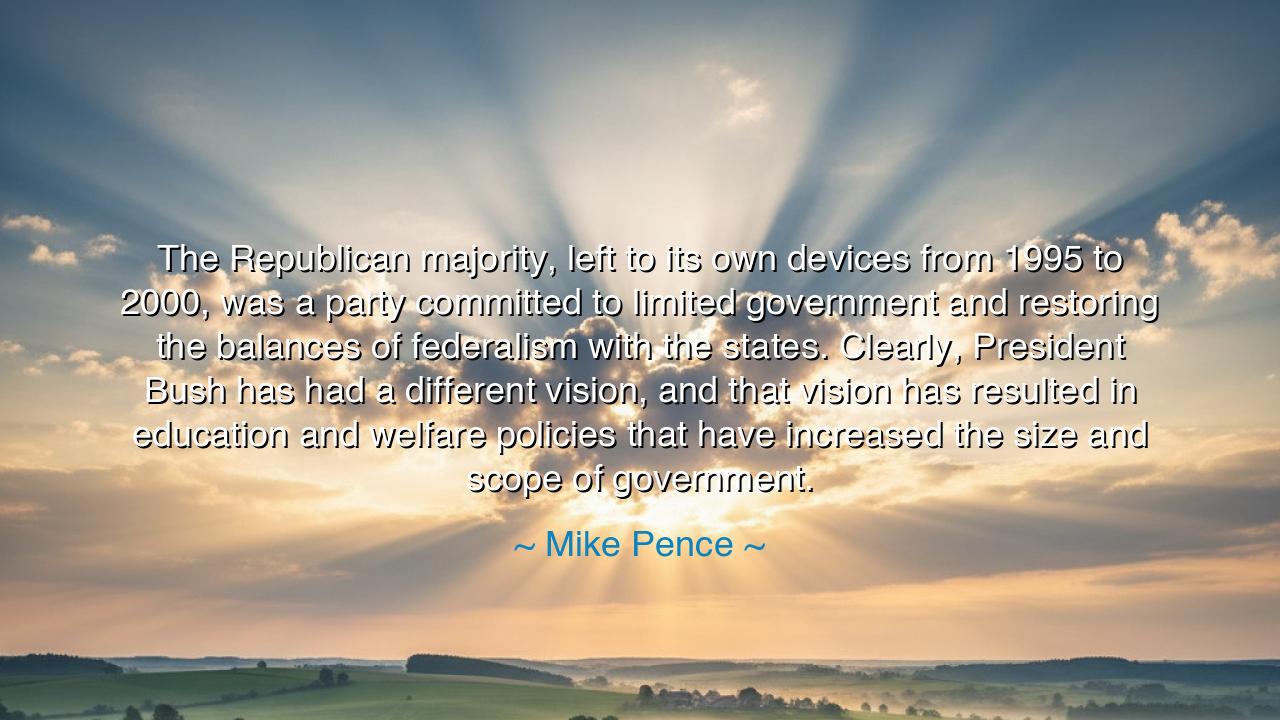
The Republican majority, left to its own devices from 1995 to
The Republican majority, left to its own devices from 1995 to 2000, was a party committed to limited government and restoring the balances of federalism with the states. Clearly, President Bush has had a different vision, and that vision has resulted in education and welfare policies that have increased the size and scope of government.






When Mike Pence spoke these words — “The Republican majority, left to its own devices from 1995 to 2000, was a party committed to limited government and restoring the balances of federalism with the states. Clearly, President Bush has had a different vision, and that vision has resulted in education and welfare policies that have increased the size and scope of government.” — he was not merely making a political observation. He was drawing from an old and recurring truth of governance: that power, once concentrated, tends to expand, and that even noble intentions can give rise to great imbalance. His statement is not a condemnation of any single leader, but a lament for a forgotten principle — that the greatness of a republic lies not in the magnitude of its government, but in the freedom of its people.
Pence’s reflection reaches back to the founding philosophy of the United States, a nation born from rebellion against centralized authority. The vision of limited government — what he calls “restoring the balances of federalism” — was the covenant of the early Republic. The states were to remain strong, free to govern according to their people’s will, while the federal government served as their protector, not their master. This delicate balance was the architecture of liberty. Yet, as Pence reminds us, even among those who claim to cherish it, the lure of expansion remains powerful. For power grows like ivy — slow, persistent, beautiful to the eye, yet suffocating to the structure it adorns.
When President George W. Bush entered office, his policies on education and welfare — particularly initiatives such as the No Child Left Behind Act — sought to uplift standards across the nation. But to Pence and those of his persuasion, such programs came at a hidden cost: the quiet erosion of state sovereignty and the creeping enlargement of federal reach. What had begun as a vision of compassion became, in time, an example of the paradox of power — that even benevolent governance, when expanded too far, begins to diminish the freedom it was meant to serve. Thus, Pence’s words are not the cry of partisanship, but the warning of an old republican spirit that sees in every centralization the seed of dependency.
This struggle between liberty and authority has echoed through all ages. The historian may recall the Roman Republic, whose citizens once prized restraint and the division of power. Yet, through generations of crisis and ambition, the Senate ceded its authority to the emperors — first out of necessity, then out of habit. The people, weary of chaos, chose security over sovereignty, and thus the Republic perished not by conquest, but by the slow surrender of self-rule. Pence’s reflection carries that same ancient caution: that when citizens place all their hopes in the hands of one distant power, the pillars of freedom begin to tremble.
But there is also nobility in his lament — for he speaks not merely of government, but of vision. “Clearly,” he says, “President Bush has had a different vision.” In these words lies an acknowledgment of sincerity — that even those who differ may do so with conviction. For every generation must wrestle anew with the question of how much power is enough. One vision sees strength in unity and reach; the other, in restraint and independence. The true art of leadership lies in balancing these forces — ensuring that compassion does not dissolve responsibility, and that governance does not devour liberty.
Pence’s reflection also speaks to the heart of human nature itself. For the desire to centralize is not confined to nations; it resides in every individual. The impulse to control, to organize, to dictate outcomes often comes cloaked in goodness — as when a parent overprotects or a leader overregulates. But wisdom, as the ancients taught, lies in knowing when to let go, in trusting the strength of others to govern their own affairs. The principle of federalism is but a reflection of that deeper moral truth: that freedom requires faith — faith in the competence of the people and the virtue of shared responsibility.
The lesson, then, is timeless: Guard against the comfort of control. Whether in politics, business, or the human soul, the temptation to expand authority in the name of improvement must be met with humility. True leadership does not seek to command every detail, but to empower others to flourish. The republic that endures is not the one with the greatest reach, but the one with the greatest trust in its citizens. And so, in the wisdom of Mike Pence’s words, we are reminded that liberty must be tended like a flame — not smothered by protection, nor abandoned to neglect, but guarded with reverence and restraint.
Thus, let his reflection echo beyond the realm of politics, into every sphere where power meets purpose: Freedom endures only where restraint is honored. When we forget that, our good intentions, like unchecked vines, may one day cover the very sunlight of liberty under which they first began to grow.






AAdministratorAdministrator
Welcome, honored guests. Please leave a comment, we will respond soon